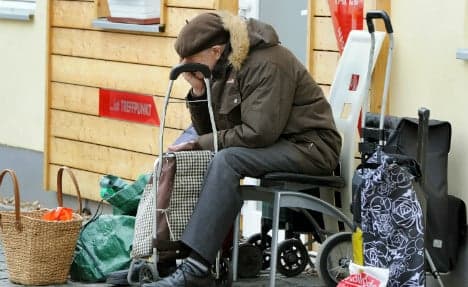Former East to lag behind West for years to come: study

Twenty-six years after reunification, eastern Germany remains economically anaemic with little prospect of catching up with the rest of the country by 2030, a study published on Wednesday said.
Of the eastern states, only "Saxony and Brandenburg will reach the level of overall average German growth" between 2015 and 2030, wrote Joachim Ragnitz of the Ifo economic think-tank.
The remaining federal states formed from the former territory of the German Democratic Republic (GDR) - Mecklenburg-Western Pomerania, Thuringia, and Saxony-Anhalt - will by contrast reckon with "in parts extremely low growth rates".
Eastern Germany's GDP grew by 1.2 percent per year between 2010 and 2015, underperforming the 1.6 percent achieved by western Germany plus Berlin, Ifo calculated.
While Brandenburg benefits from its proximity to Berlin and Saxony boasts two attractive large cities in Dresden and Leipzig, the other "new states" face significant challenges.
The former GDR has seen a decades-long emigration of the young, exacerbating the ageing population problem due to low birth rates that affect all of Germany.
"Exactly the people with a high level of qualification who could push increased productivity and innovation are lacking," Ragnitz wrote.
As well as sapping the supply side of the economy with a brain drain, demographic weakness also undermines demand, as fewer people are around to spend in the local economy.
Meanwhile, Ragnitz noted that "large, structurally defining firms are largely lacking", apart from subsidiaries of foreign firms, meaning "higher-value business functions are lacking and strategic decisions taken without taking east German interests into account."
Most firms in eastern Germany remain small, concentrating on market niches - and are therefore "by definition notable for their limited opportunity to expand".
Not one of the 30 leading firms listed on the DAX stock market index is based in the former GDR.
Ragnitz argues that public investment should be focused on improving small- and medium-sized firms' competitiveness and make up for lacking private investment in research and development.
But both EU structural development funds and solidarity payments from wealthier western states are set to dry up in 2020.
Comments
See Also
Of the eastern states, only "Saxony and Brandenburg will reach the level of overall average German growth" between 2015 and 2030, wrote Joachim Ragnitz of the Ifo economic think-tank.
The remaining federal states formed from the former territory of the German Democratic Republic (GDR) - Mecklenburg-Western Pomerania, Thuringia, and Saxony-Anhalt - will by contrast reckon with "in parts extremely low growth rates".
Eastern Germany's GDP grew by 1.2 percent per year between 2010 and 2015, underperforming the 1.6 percent achieved by western Germany plus Berlin, Ifo calculated.
While Brandenburg benefits from its proximity to Berlin and Saxony boasts two attractive large cities in Dresden and Leipzig, the other "new states" face significant challenges.
The former GDR has seen a decades-long emigration of the young, exacerbating the ageing population problem due to low birth rates that affect all of Germany.
"Exactly the people with a high level of qualification who could push increased productivity and innovation are lacking," Ragnitz wrote.
As well as sapping the supply side of the economy with a brain drain, demographic weakness also undermines demand, as fewer people are around to spend in the local economy.
Meanwhile, Ragnitz noted that "large, structurally defining firms are largely lacking", apart from subsidiaries of foreign firms, meaning "higher-value business functions are lacking and strategic decisions taken without taking east German interests into account."
Most firms in eastern Germany remain small, concentrating on market niches - and are therefore "by definition notable for their limited opportunity to expand".
Not one of the 30 leading firms listed on the DAX stock market index is based in the former GDR.
Ragnitz argues that public investment should be focused on improving small- and medium-sized firms' competitiveness and make up for lacking private investment in research and development.
But both EU structural development funds and solidarity payments from wealthier western states are set to dry up in 2020.
Join the conversation in our comments section below. Share your own views and experience and if you have a question or suggestion for our journalists then email us at [email protected].
Please keep comments civil, constructive and on topic – and make sure to read our terms of use before getting involved.
Please log in here to leave a comment.